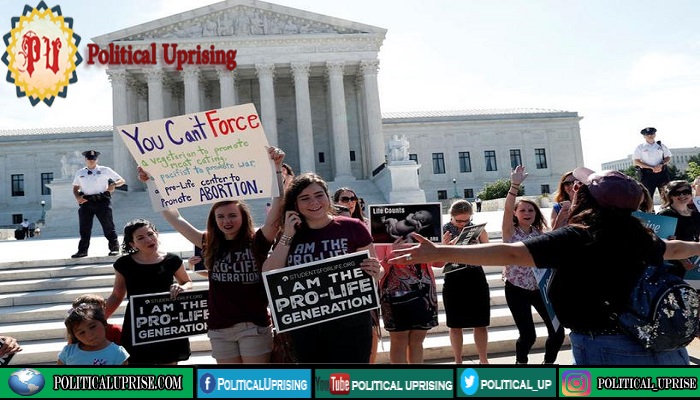Supreme court justices agreed to hear a abortion case that could lead to new curbs on access to procedure as it considers legality of Republican backed law.
The justices will hear an appeal by abortion provider Hope Medical Group for Women, which sued to try to block the law, of a lower court ruling upholding the measure. The Shreveport-based Hope Medical Group said implementation of the law would prompt the closure of two of the state’s three abortion clinics. The court will also hear a separate appeal by the state claiming that the abortion clinics do not have legal standing to sue.
The law includes a requirement that doctors who perform abortions have a difficult-to-obtain arrangement called “admitting privileges” at a hospital within 48km (30 miles) of the abortion clinic.
The Supreme Court struck down a similar Texas requirement in 2016 when conservative Justice Anthony Kennedy joined the four liberal justices to defend abortion rights, but Kennedy retired in 2018 and Republican President Donald Trump replaced him with conservative Justice Brett Kavanaugh, with the court moving further to the right.
The case will test the willingness of the court, which has a 5-4 conservative majority that includes two Trump appointees, to uphold Republican-backed abortion restrictions being pursued in numerous conservative states. Anti-abortion rights activists are hoping the court will scale back or even overturn the 1973 Roe v Wade ruling that legalised abortion nationwide.
The court will review a September 2018 ruling by the New Orleans-based 5th US Circuit Court of Appeals that upheld the Louisiana law. The Supreme Court in February on a 5-4 vote prevented the law from going into effect while litigation over its legality continued.
A ruling in the Louisiana case is due by the end of June.
The justices on Friday took no action on another abortion-related case concerning the state of Indiana’s effort to revive an abortion-related law requiring women to have an ultrasound 18 hours before having an abortion.
Since Kavanaugh joined the court last October, it has sent mixed signals on abortion. The court in June declined to hear a bid by Alabama to revive a Republican-enacted law that would have effectively banned abortions after 15 weeks of pregnancy.
In May, it refused to consider reinstating Indiana’s ban on abortions performed because of fetal disability or the sex or race of the fetus while upholding the state’s requirement that fetal remains be buried or cremated after an abortion.
According to the Guttmacher Institute, a reproductive health research and policy organisation, nearly 60 abortion restrictions have been enacted in 2019 as of September 15.
Supreme court justices agreed to hear a major abortion case that could lead to new curbs on access to the procedure as it considers the legality of a Republican-backed Louisiana law that imposes restrictions on abortion doctors.



